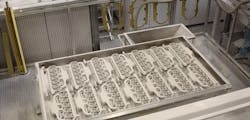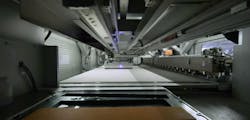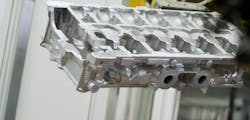BMW’s Landshut plant manufactures key components for the company’s BMW, Mini and Rolls-Royce automobiles. Serving as the company’s center of excellence for lightweight construction and electric mobility, the Landshut plant houses an emission-free aluminum foundry, which is used to cast components for more than 3,000,000 parts annually, such as cylinder heads and crankcases.
Aluminum is considered one of the lightest engineering metals with a strength-to-weight ratio superior to steel, making it an ideal material for many critical automotive components.
At the Landshut plant, BMW uses four of ExOne’s Exerial binder jet 3D printing systems in its serial production of sand cores used for metal casting of hundreds of thousands of components each year. More specifically, BMW uses the ExOne in the manufacture of six-cylinder engine components for the company’s M3 and M4 series.
Eric Bader, managing director of ExOne, a Desktop Metal company, explained that the additive manufacturing technology at the core of BMW’s use of the Exerial 3D printing system is binder jetting. In binder jetting applications, an industrial printhead selectively deposits a binder into a bed of powder materials—such as sand, metal or ceramic—creating a solid part one thin layer at a time. When used for sand casting, as BMW does at its Landshut plant, the non-binded sand is removed to reveal a mold used for casting molten aluminum. When combined with a microwave, a de-sanding station and an automated conveyor system, the Exerial system can run high-speed, high-accuracy 24/7 production operations.
After the sand cores are printed, they are mated with molds for pressure casting in the factory. “Molten aluminum is injected into the tools and the final hardened part meets BMW's requirements,” said Bader. “Furthermore, these printers deliver the high accuracy and quality that BMW standards require. And because it's 3D printing, we can deliver complex designs with ease. But what makes this binder jetting technology especially friendly to serial production is its extremely high speed.”



